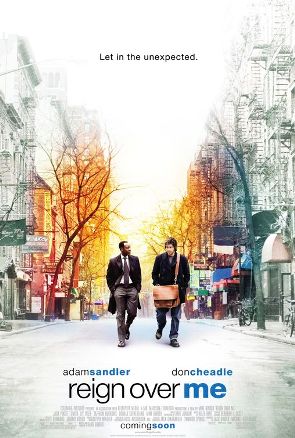2007.12.15 Reign Over Me

We just watched the movie Reign Over Me last night.
The idea, nominally, was that the psychological element of the movie would appeal to The Wife's proclivities, so I queued it up in Netflix without consulting her. I thought it might be a nice concession after forcing her to watch yet more Akira Kurosawa movies lately. Truthfully, though, it seemed somewhat unlike other drama-type titles in that it didn't seem to warn me away instinctively. Perhaps it had something to do with The Who connection - I love many guitar/screaming songs.
The apparent gist of the movie revolves around the Sandler character's grief. His loss of his entire family - wife, two daughters, and even his dog - on one of the planes in the 2001 September 11th attacks seems to be shown as the bottom of a pit of darkness that Sandler's character has slid down, and around which everyone else's lives are affected and swirl somewhat helplessly. Sandler's character is lost, trying to cope with his pain with simple escapism, and everyone else in the movie is trying in some way or another (often counterproductively) to save him from his grief. Meanwhile, everyone else's mundanely-shitty-yet-successful lives are shown in juxtaposition, helping frame the difference in coping strategies and perhaps also the scale of emotion involved.
You'll notice that I said "apparent" and "seems" and "shown" pretty deliberately.
The reason is that I feel like the default extrapolation of this tale is to see Sandler's character with pity, and to imagine what might be possibly done in order to help him. Everybody's mind gets bent towards the task of "save him", "fix him", "help him". It's all very laudable, really. I'm a big proponent of functionality, be it in imaginary characters, a real audience, or writers (who deserve to get a fair cut of electronic media profits). Utility is even what I consider one of the most important philosophical orientations. Yet, beside this obvious manner of looking at the movie, I feel like there is another interpretation that is, perhaps, more significant.
Maybe Sandler's character is the one that should be pitying all the other characters. Maybe his misery is more than just a matter of his inability to cope and move on with his life to become functional and useful again. Maybe he is what he needs to be because of the sheer magnitude of what he feels - a magnitude beyond most people's comprehension. Maybe he is the only character in the whole movie that has already lived a life worth living, by loving so deeply that coping with its loss is not only impossible but perhaps unimportant.
Yes, I'm a gigantic suck. But work with me here. Assume that I get the idea of the importance being a functional human being. Think about whatever it is that you love the most, that isn't yourself. Is it as important as you are to yourself? Is it even more important to you than yourself? What would happen to you if you lost it? (I say "it", but I'm betting that it's probably a person.) Is it conceivable that you could recover and move on? You probably can - simply because humans do, and because we're generally built with a strong survival instinct. Now imagine loving more, but without giving up yourself at all.
Do you understand what I'm trying to say? Imagine that the love you have is greater, but that it in no way diminishes yourself. You still love yourself as much as you ever did, with all your strength and self-respect and will and raw personal power. Imagine yourself as great a person as you think you can be, yet towering over it all is this love that dwarfs your healthy ego. A love so staggeringly grand that the only sane thing to do when it is gone is to grieve it with your whole self. Imagine the loss so profound that you do not regret the ongoing grief, because it feels like the very least you can do to pay homage to an existence that let you have that love for even as briefly as you did.
I don't know. Maybe. I'm just saying that Sandler's character might not have been just some poor fuck-up with a particularly sad story. Maybe he was somebody who merely transcended our mundane perceptions of love and loss.